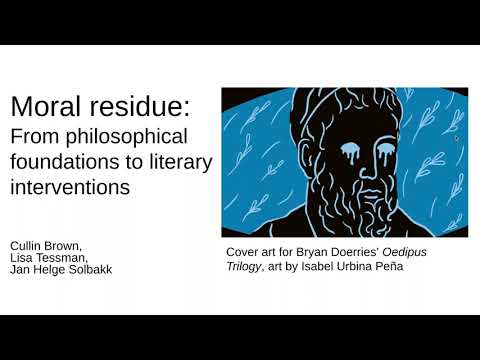 Speaker: Cullin Brown
Speaker: Cullin Brown
 Affiliation: Binghamton University & University of Oslo
Affiliation: Binghamton University & University of Oslo
Title: Moral Residue: Philosophical and Literary Foundations to Develop a Typology
Abstract (long version below): We delve into the power of literary fiction in medical ethics education, focusing on moral residue (MR) experienced by healthcare practitioners (and other moral agents) when they perceive their own failure to meet moral requirements despite other people’s tendency not to blame them. Four inter-reliant papers describe ongoing research in an ERC Advanced Grant project (see Acknowledgement below), aimed at revolutionizing training of professionals by utilizing literary texts: these papers conceptualize and create a typology of MR, devise a measure for MR awareness, pinpoint text and context factors that may enhance awareness of MR, and implement an intervention using literary, fictional scenarios to facilitate moral learning in medical ethics.

 Long abstract
Long abstract
This paper has two aims. The first is to introduce the philosophical foundations of moral residue (MR). This is an important task because many who subject MR to philosophical scrutiny come to the conclusion that it is ultimately mistaken–that even though it is understandable that we sometimes hold ourselves responsible in ways that go beyond our blameworthiness, we are not really responsible in these ways. Against these views, I draw on a sentimentalist philosophical framework that vindicates many experiences or MR. This is not to say that we (i.e., other parties) should hold people who experience MR responsible in the same way they hold themselves responsible, but, I will argue, that people who experience MR are oftentimes right in holding themselves responsible in the relevant ways.
The second aim of this paper is to use literary fiction to develop a typology of MR. I argue that MR can take at least four forms, depending on a) whether the person experiencing MR blames themself or holds themself responsible in an anguished but non-blaming way, and b) whether or not other people normatively expect the person experiencing MR to hold themself responsible in the relevant way, even though such others realize that they would be wrong to hold the person responsible in that way. Beyond affording a typology of MR, that fictional literature is replete with MR and its nuances suggests that MR is an important human experience with the potential to shed light on the human condition.

